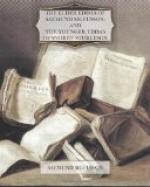“But what will preserve this abode when Surtur’s fire consumes heaven and earth?” asked Gangler.
“We are told,” replied Har, “that towards the south there is another heaven above this called Andlang, and again above this a third heaven called Vidblain. In this last, we think Gimli must be seated, but we deem that the Elves of Light abide in it now.”
OF THE WIND AND THE SEASONS.
19. “Tell me,” said Gangler, “whence comes the wind, which is so strong that it moves the ocean and fans fire to flame, yet, strong though it be, no mortal eye can discern it? wonderfully, therefore, must it be shapen.”
“I can tell thee all about it,” answered Har; “thou must know that at the northern extremity of the heavens sits a giant called Hraesvelgur, clad with eagles’ plumes. When he spreads out his wings for flight, the winds arise from under them.”
20. “Tell me further,” said Gangler, “why the summer should be hot, and the winter cold.”
“A wise man would not ask such a question, which every one could answer,” replied Har; “but, if thou hast been so dull as not to have heard the reason, I will rather forgive thee for once asking a foolish question than suffer thee to remain any longer in ignorance of what ought to have been known to thee. The father of Summer is called Svasuth, who is such a gentle and delicate being that what is mild is from him called sweet. The father of Winter has two names, Vindloni and Vindsval. He is the son of Vasad, and, like all his race, has an icy breath, and is of a grim and gloomy aspect.”
OF ODIN.
21. “I must now ask thee,” said Gangler, “who are the gods that men are bound to believe in?”
“There are twelve gods,” replied Har, “to whom divine honours ought to be rendered.”
“Nor are the goddesses,” added Jafnhar, “less divine and mighty.”
“The first and eldest of the AEsir,” continued Thridi, “is Odin. He governs all things, and, although the other deities are powerful, they all serve and obey him as children do their father. Frigga is his wife. She foresees the destinies of men, but never reveals what is to come. For thus it is said that Odin himself told Loki, ’Senseless Loki, why wilt thou pry into futurity, Frigga alone knoweth the destinies of all, though she telleth them never?’
“Odin is named Alfadir (All-father), because he is the father of all the gods, and also Valfadir (Choosing Father), because he chooses for his sons all of those who fall in combat. For their abode he has prepared Valhalla and Vingolf, where they are called Einherjar (Heroes or Champions). Odin is also called Hangagud, Haptagud, and Farmagud, and, besides these, was named in many ways when he went to King Geirraudr,” forty-nine names in all.
“A great many names, indeed!” exclaimed Gangler; “surely that man must be very wise who knows them all distinctly, and can tell on what occasions they were given.”




